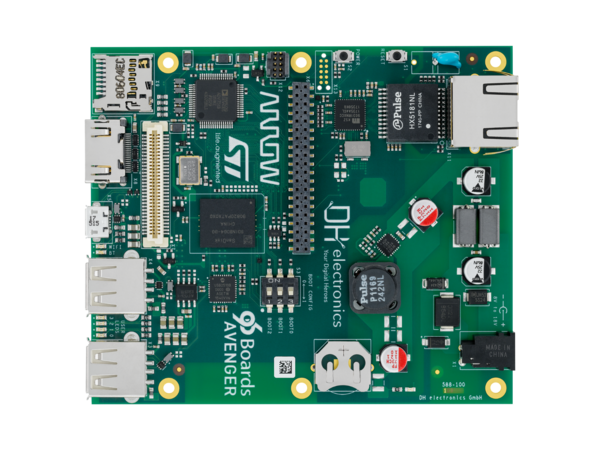Avenger96: Difference between revisions
| Line 71: | Line 71: | ||
* [[media:588-200_TOP_ASSEMBLY__R04_2019-04-12.pdf|Assembly Top]] | * [[media:588-200_TOP_ASSEMBLY__R04_2019-04-12.pdf|Assembly Top]] | ||
* [[media:588-200_BOTTOM_ASSEMBLY__R04_2019-04-12.pdf|Assembly Bottom]] | * [[media:588-200_BOTTOM_ASSEMBLY__R04_2019-04-12.pdf|Assembly Bottom]] | ||
* [[media:BRD_588-200-with-DHCOR_2020-06-22.STEP|3D STEP | * [[media:BRD_588-200-with-DHCOR_2020-06-22.STEP|3D STEP file]] | ||
== DHCOR STM32MP1 schematic and layout symbols == | == DHCOR STM32MP1 schematic and layout symbols == | ||
Revision as of 15:59, 22 June 2020

|
Introduction
The AVENGER Board is a 96Boards compliant consumer edition board based on the STM32MP15 series of SoCs. The STM32MP15 series is a highly integrated multi-market applications processor designed to enable secure and portable applications within the Internet of Things. AVENGER board features Dual-core Arm® Cortex®-A7 processors operating at up to 650 MHz, Single core Arm® Cortex® M4 operating up to 209 MHz. In addition, an extensive set of interfaces and connectivity peripherals are included to interface to cameras, touch-screen displays, MMC/SD cards and media processor engine. It also fully supports wireless communication, including WLAN and BLE.
Technical Details
|
|
Documentation
- Avenger96 588-200 Getting-Started R03
- NEW DHCOR STM32MP1 User Manual R05 IMPORTANT: Please have a look at NEW chapter 24. Hardware design checklist
- IMPORTANT Please also have a look at the STM32 MPU wiki: Links
Avenger96 Design Files
DHCOR STM32MP1 schematic and layout symbols
DHCOR STM32MP1 3D STEP file
DHCOR STM32MP1 STM CubeMX configuration
Yocto meta layer
DH electronics Github contains the meta-av96 layer for ST v1.2.0 SDK. Please see readme.txt which describes the build process.
Images
Useful instructions
SPI Flash and eMMC Image Programming
Add camera support to Avenger96 board
Links
OpenSTLinux-4.19-thud Image Changelog
Changelog v3.2.0 to v4.1.0:
- STMIPID02 and D3 camera mezzanine patches added, OV5640 camera can be tested with the default Weston GUI.
- Source folder structure reworked. meta-av96 now uses a ‘repo’ manifest-based setup. ‘thud’ branch created and folder structure resembles more the ST way.
Changelog v2.1.0 to v3.2.0:
- U-Boot sets ethernet MAC address from 24AA02 EEprom
- mmc0 now supports switching to 1.8V, UHS-I cards speeded up
- HW version 1 added to U-Boot device tree, U-Boot now checks HW version of the actual Avenger96 board
- Flashlayout file generation fixed, no need to change Flashlayout files manually before programming nor+emmc
Changelog v2.0.3 to v2.1.0:
- HDMI max resolution fixed, it’s 1280x720@60Hz again
- DRAM size in U-Boot fixed, Linux now sees the whole 1GB
- UART0 and SPI now supported on low-speed extension connector
- tpm2-tools and tpm2-tss-engine for openssl added, TPM2.0 chip on Tresor board supported by openssl
Changelog v2.0.2 to v2.0.3:
- DHCP server running at usb0 network interface
Changelog v2.0.1 to v2.0.2:
- Supported features in U-Boot: UART, DDR3, QSPI, uSD, eMMC, ethernet
- PRODUCT_BELOW_2V5 fix in U-Boot
- Supported features in Linux: UART, uSD, eMMC, USB host, USB OTG, HDMI, GPU, WiFi, Bluetooth, Gbit ethernet
- STM32CubeProgrammer can initialize NOR, eMMC, uSD
- Avenger96 can boot from uSD or NOR+eMMC
- BSP contains a single meta-av96 layer and a readme.txt
- BSP builds the whole uSD or NOR+eMMC image in a single step, no extra file operations are needed
- Standard STM32MP157C-DK2 demo runs on Avenger96: WiFi hotspot, video playback with sound, 3D demo
Improvements compared to av96 v2.0.1:
- SDMMC1,2,3 order fixed, build process simplified
- WiFi fixed
- Sound over HDMI, GPU support (there was no GPU in v2.0.1 because of EULA issues during build)
- Bluetooth support, dummy soundcard added for BT (not tested yet)
- QSPI, eMMC in U-Boot, PRODUCT_BELOW_2V5 programming added -> Gbit ethernet
- STM32CubeProgrammer can initialize NOR, eMMC, uSD (a single manual modification of flashlayout files is still needed for NOR+eMMC boot -> needs to be documented yet)
Changelog v1.2 to v2.0.1:
- Switch to ST v1.0.0 SDK with 4.19 kernel
- Till now, not all features of v1.2 (based on beta1 release of ST with 4.14 kernel support) are supported with v2.0.1 release
- NOT working: QSPI in U-Boot and Linux, eMMC in U-Boot, WiFi, …
- Working interfaces: HDMI, Ethernet, USB, uSD card and Gigabit ethernet (on board with programmed PRODUCT_BELOW_2V5 fuse)
Changelog v1.1 to v1.2:
- /home/root folder contains simple OpenAMP demo
- HSLVEN_QSPI fix (from ST) was added to make QSPI boot work again with PRODUCT_BELOW_2V5 programmed
Changelog v1.0 to v1.1:
- Updated U-Boot which programs the PRODUCT_BELOW_2V5 fuse if necessary and reboots the board
- BUCK3 voltage changed to 2.5V which enables Gbit ethernet support
- Icon added in Weston for starting glmark2-es2-wayland
- /etc/issue contains version info
- Reduced display resolution of HDMI
Old Images and Yocto releases:
- OpenSTLinux-4.19-thud v3.2.0 Starter Image
- Avenger96 v2.1.0 Starter Image
- Avenger96 v2.0.3 Starter Image
- Avenger96 v2.0.2 Starter Image
- Avenger96 v2.0.1 Starter Image
- Avenger96 Yocto meta layer (based on v2.0.1 image from 2019-04-12)
- Avenger96 v1.2 Starter Image
- Avenger96 v1.1 Starter Image
- Avenger96 Embedded World v1.0 Starter Image